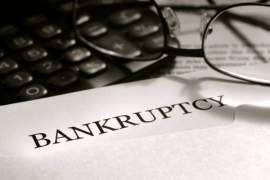
Make Sure You Consider Bankruptcy Alternatives

Though the U.S. Federal Government is quite active in its protection of debtors in bankruptcy proceedings and is understanding of their plight, this is not a tacit endorsement of average people following this route. This is to say that debtors should not want to declare bankruptcy, but should have no other choice. Contact bankruptcy lawyers for legal advice and assistance. Before reaching their proverbial eleventh hour, though, many debtors will already be looking toward alternatives to filing for bankruptcy, if for no other reason than to spare themselves the shame they would feel.
There are a number of alternatives to bankruptcy available to most debtors. Some are relatively simple and reflect good money management skills. Other times, the complexities of tax law and the entanglements of civil court may come into play. Irrespective of their circumstances, people with sizable debts should try to exhaust all other options before skipping ahead to bankruptcy. In terms of their financial health in the years to come, their choice of debt management strategy can make all the difference in the relative ease or difficulty of them taking care of themselves.
Making a Budget
Some people might be eager to move forward with bankruptcy, thinking that their problems with debt are too difficult to manage otherwise. Realistically, however, they may be able to meet their quotas every month. They may just need a little financial reorganization in their everyday lives to achieve this goal.
The strategy of budgeting one's funds is indeed pretty basic, but some may have not considered it as an alternative to bankruptcy or have been too stubborn to try it. Either way, budgeting can make a dramatic impact on some debtors' situations.
One major area for any person making a strict budget to address is is large and extraneous purchases. Certainly, the acquisition of luxury items like new cars and jewelry should be avoided, as well as credit cards previously used in buying them. Depending on the severity of their circumstances, debtors may need to sell their existing possessions of this kind outright. Other expenses, while not exactly flights of fancy, can still be reduced because they are partially motivated by want rather than need.
Entertainment like movies and cable television, and meals ordered outside the home are pretty common elements of a budget that may not seem like they are that costly, but after a few months, these sums tend to add up against the debtor's favor. Even monies donated to charity and those given out to friends and family for special occasions need to be scaled back in times of crisis. It may seem a callous move by some, but until one gets his or her house in order short of breaking the law, such actions may be necessary.
Wage Garnishment
For debtors who are regular earners of income, they may make the willful decision to take out a portion of their take-home pay and contribute it to eliminating the balance on their debts. As is usually the case, though, it will be the actions of the creditor that force this option, formally known as "wage garnishment." Pending a court order to garnish a worker's wages, employers may neither disregard this mandate nor may they terminate the staff member who has to submit to having their disposable income cut down by these collections.
The most important constraints, though, are the ones that materially affect both debtor and creditor. In instances of involuntary wage garnishment, which are within the legal bounds of lenders to explore after failed attempts to recoup on their investments, those who have their paychecks subtracted from are going to feel the pinch, especially if their delinquent financial obligations are related to State and Federal income tax or outstanding domestic support (i.e. child support and alimony).
Nonetheless, there are limits to how much per paycheck lenders can pursue. Title III of the Consumer Credit Protection Act specifies that, barring the above special conditions, a wage earner may only submit up to 25% of his or her take-home pay, or thirty times the hourly minimum wage, whichever comes first.
Sale of Assets
An individual or business mired in debt does not necessarily have to formally declare bankruptcy to sell off assets. On the contrary, some may simply sell their assets independently, employing a do-it-yourself Chapter 7 situation.
Really, though, anyone can hope to sell their possessions and use the proceeds to pay off outstanding debt. This may start very simply by debtors holding garage sales to get some compensation for items they have around their house that are of limited value or practical use to them.
Nonetheless, if debt still lingers, debtors may have to get more drastic with forfeiture of their property, which they definitely should consider in full before going ahead with a permanent transaction.
In terms of assets that reflect people's everyday needs, homes and cars are among the items on which one is more apt to get a return, that is, if they can afford to live without either one or with a different, cheaper model. Cashing out on personal benefits like Social Security and retirement plans, meanwhile, may be a quick fix, but can hurt the debtor in terms of early termination fees and the inability to meet expenses when he or she can no longer work.
Negotiation/Settlement
In worst-case scenarios, creditors will call and contact debtors almost to the point of harassment before the former files suit or the latter files for bankruptcy. Under more agreeable circumstances, lenders and borrowers will be able to reach an agreement where monies owed are reduced and then paid in full with the idea that this will bring an end to the debtor-creditor relationship.
With debt negotiation or debt settlement (the names are different but the concept is equivalent), debtors and creditors reach a consensus on a lump sum to be given to the creditor. Not only is this sum a guaranteed amount for the creditor to get after minimum monthly payments (or none at all) that were previously due from the debtors were not paid, but it allows both parties to avoid bankruptcy court.
As far as debtors are concerned, there are definite do's and don'ts when negotiating with lenders. Of course, the overall reduction of debt is the most critical part of the process. However, along with reaching a settlement, debtors should try to sweeten the deal, so to speak. Though debt settlements may be attractive ways of making debt payments easier to fulfill, these agreements may also lead to a concurrent reduction in one's credit rating.
As such, debtors should likewise bargain—forcefully but respectfully—to see if they can get any negative reports on their financial record mitigated. On the other hand, debtors should be exceedingly wary about involving a third party in the negotiation other than a licensed attorney.
Debt Management Plans
Some debtors may be most familiar with credit counseling agencies because of the needs engineered by the BAPCPA. The big incentives here are a lowering of what is still due on the principal of the loan and avoidance of bankruptcy for financial reasons, emotional reasons, or both.
As with debtor-creditor settlements, though, solicitors of this strategy should go about it with care. Licensed counseling agencies serve as go-betweens for debtors, but all the same, with the abundance of services advertised online and offline, it may be difficult to separate the more reputable operations from the scams. Accordingly, debtors should keep contact information for the Department of Justice.
Debt Restructuring
There are other benefits for business and individual debtors. Overall, maintaining the balance of one's monies owed tends to be a better option for debtors maintaining a decent credit rating, for example. For companies in particular, a deduction of the interest rate or increase in the duration of the line of credit may be buoyed by the creditor's request to become a larger equity holder in the company that serves as the debtor in this case. Such an agreement is known as a debt-for-equity swap.
Debt Consolidation
Certainly, there is no universal solution for debt management, and debt consolidation is far from one, as it is not recommended for many debtors. Still, for those parties who have trouble staying on top of their finances because of the myriad of loans they have active, or for those who have issues with the high interest of unsecured loans, debt consolidation may be a more-than-viable option.
A debt consolidation loan is a consolidation, or combination, of two or more existing loans. Usually, a consolidation loan will manifest itself in lower rates of interest. With debt consolidation, a cost-benefit analysis should definitely precede any concrete move forward.
As stated, consolidation options are not for everyone. For people with damaged credit ratings, questionable "work ethic" when it comes to management of debt, and/or pure impatience when it comes to extension of a loan, debt consolidation may not be advisable. Most of the time, though, a home equity loan or personal loan (for non-homeowners) may be within the means for applicants to secure, especially if there is a lot of equity in their home from which to draw. Plus, compared to other options like debt settlement, consolidation is likely to be more beneficial towards debtors' credit ratings.
Affirmative Defense/Counterclaim
Though creditors and debtors alike would tend to be resistant to enlisting the services of the courts to settle their disputes, sometimes they may feel as if there are no other options available and a lawsuit will ensue, usually filed by the creditor. Often, debtors will not contest the claims made by lenders, acknowledging their full financial responsibility in these matters or simply believing they are unlikely to win. Just the same, debtors are not completely defenseless when it comes to these proceedings. Of course, they may revert to what essentially is an in-court debt settlement which, if nothing else, may decrease the total balance they owe.
Then again, debtors may also try to win the case or file a separate claim against the creditor through an argument ancillary to the original claim of principals lent/loans defaulted on. One such tactic defendants and their legal representatives may employ is an affirmative defense, which seeks a dismissal based on a more general violation on the part of filers of the suit, including failing to file within the statute of limitations and improper documentation of claims.
Another move debtors may pursue, especially when they feel collectors have acted unethically or illegally, is what it is known as a counterclaim. Potentially, the holder of the counterclaim may earn hundreds if not more in compensation for their suffering.
Do Nothing
Applications for bankruptcy do not necessarily come with a full or even adequate understanding of how bankruptcy works. Some may believe bankruptcy is tantamount to having no usable assets in bankruptcy cases, but restructuring plans for individuals and businesses, for example, would suggest otherwise. Still, when current assets present little value to creditors and when future income seems insufficient, the best response to debtors might be not to respond, at least not in terms of filing under a specific chapter of the Bankruptcy Code. Of course, this is not going to be a realistic option for all debtors; only those whose unsuitability for a lawsuit yields them "judgment proof" status.
In all, a more passive approach to debt resolution is a definite risk-reward strategy considering the language of the law. On the plus side of things, aside from normal properties possessing little worth to lenders, exempt properties will generally be untouchable in bankruptcy cases. Furthermore, wage garnishment orders, barring obligations to tax collectors and estranged former spouses and biological children, are held to a 25% maximum as far as collection actions go. On the minus side, however, unlike with bankruptcy, this option neither cancels out debts nor guarantees creditors will stop calling, and imaginably, it may do serious damage to one's credit rating in the long run.



















